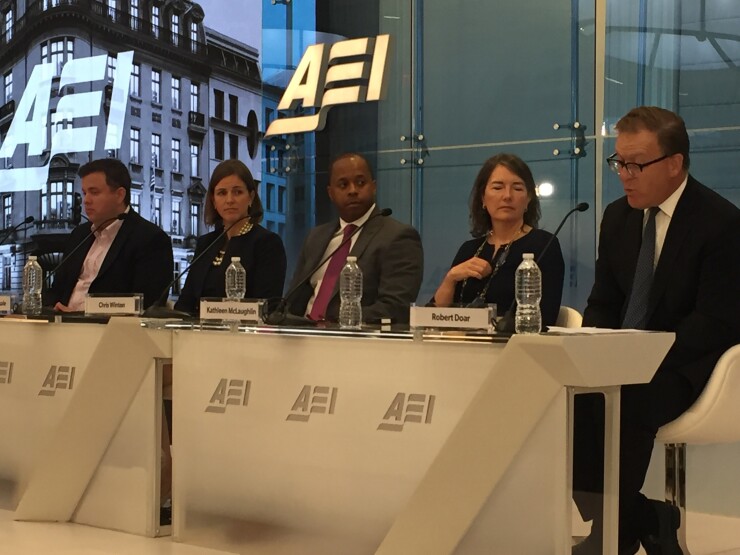Leading employers are finding ways to invest in their talent pool and help employees, particularly entry-level and low-wage workers, climb the ladder and rise to the top.
There are a disproportionately large number of entry-level jobs in the retail sector, says Kathleen McLaughlin, a senior vice president at Walmart. The question is, what happens to them after that? Do they stay at that level forever?
“The sector has a very high (60%) level of turnover,” she said Friday, speaking on a panel of national employers at the American Enterprise Institute. “[Workers aren’t] not coming in and attaching; they’re coming in and leaving. That’s the problem we’re trying to solve. At Walmart, we’re not creating just a ladder, but a lattice so they can find adjacent jobs in other sectors.”
She stressed the importance Walmart places on providing workers with both stability and mobility.
In terms of stability, she says, Walmart recently has evaluated its compensation and benefit packages, begun offering healthcare to full- and part-time employees and increased its base hourly wage to

But, she noted, the hot-button benefit right now is
See also:
Previously, full-time hourly workers were eligible for up to eight weeks of paid maternity leave and two weeks of paid parental leave, while hourly workers received half-time pay during family leave.
“An hourly associate [now] has the same amount of maternity leave I would,” McLaughlin added. “That’s a generous package for entry-level people, but it’s important because people have families. This is why stability is important.”
Mobility — helping people advance in their careers — is equally important, McLaughlin said. Walmart has invested $2.7 billion in training and education programs, she noted, adding “we’ve got to find a way for people to get skills on the job.”
She pointed to the company’s Walmart Academy program, which provides advanced training for workers. “This is what gives people the skills to move up that ladder,” she said.
Since its creation about 18 months ago, 325,000 workers have graduated from the academy. “These are fundamental skills that help people stick. And it helps stability as much as it helps mobility.”
Echoing the importance of mobility, financial giant JPMorgan Chase has taken steps to boost its employee mobility, increasing wages and providing a structure to advance.
“We don’t need legislators to help tell us how we should think about recruiting our talent,” added Amanda Eversole, managing director and head of public affairs at JP Morgan Chase. “Twice in the past two years we have proactively raised our minimum wage, depending on geography, to $10 to $15.”
The focus on employee mobility is important, she added. “You have to give people a purpose and a place to go, and the ability to have pride in being able to support themselves and support their families.”
Chris Winton, vice president of human resources at FedEx, said employers will see the ROI on their employee investment.
“When you put your people first, they’ll deliver awesome service and that service generates profit, and we take that profit and reinvest in the people,” Winton said. “That’s our culture.”
But it isn’t just higher wages that will keep workers happy, the panel cautioned. In addition to Walmart’s education initiatives, both FedEx’s Winton and JPMorgan’s Eversole emphasized the importance of having an educated workforce.
“While we invest [in wage increases], we’re also focused on our leadership teams,” Winton said. “I didn’t hire you as a package handler; I hired you as an investment in FedEx.”





